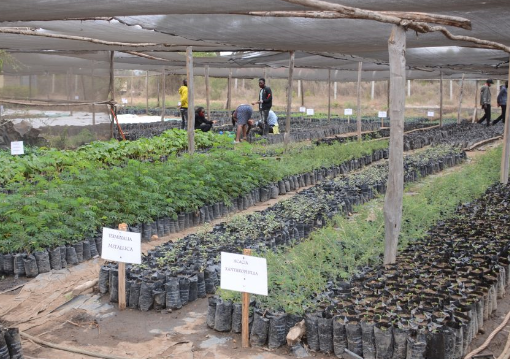Effects of worsening climate change has pushed deadly snakes out of their habitats leading to over 800 snake bites reported annually in Kitui County.
The flourishing charcoal industry, cutting down of trees to create space for farming and human settlements has led to the disturbance of the ecosystem once enjoyed by wildlife among them snakes leading to a widening human-wildlife conflict in the county.
A snake handler, Peter Musyoka disclosed that demands of timber products have resulted in indiscriminate cutting of trees, thus disrupting the eco-system which we share with the wildlife and increased cases of snakebites.
Musyoka observed that cases of snake bites typically increase at the beginning of the rainy season, when the reptiles come out of their shelters to hunt and breed.
Speaking in Kitui town on Tuesday, he admitted that the dry conditions of the county provided ample breeding ground for deadly vipers that have wrecked lives over the years from their venomous bites.
The most affected areas in the county include Kitui South, Kitui East and Mwingi Central constituencies which are endemic to snake bites.
“Access to hospitals in remote outposts of the county, the distance to the nearest health facility, poverty levels and belief in magical black stones hampers swift treatment of snake bite victims,” said Musyoka.
He lamented that the abundance of snakes in arid and semi-arid areas coupled with an underfunded health system, translates to the rising snakebite mortality rate across the county.
The snake bite menace is also prevalent in dry and arid areas like Baringo, Kitui, Kilifi, Wajir, Garissa, Machakos, Marsabit, Isiolo, Makindu, Mwingi, and Taveta as the snakes slither into homestead to seek water and shelter.
“The situation is worse during the dry spell, with snakes straying into homesteads in search of water. Residents are encouraged to put water outside their homes to reduce the chances of being bitten,” said Musyoka.
He noted that the lower limbs were the most bitten site when the victims step on these snakes as they go about their activities.
“The Public should be educated to increase use of protective wear such as use of boots while herding livestock or avoid walking at night to reduce the incidence of snake bites,” added Musyoka.
The snake handler revealed that children get multiple bites because the snakes could outrun them such as the black mamba, which is found in the region, could run fast and can bite repeatedly in quick succession.
The Kitui County Ag. County Executive of Health, Dr. Richard Muthoka said that sealing all holes and crevices, keeping lawns short, having flower beds far from houses, traps to eliminate rodents and mice and provision of water outside the house could go a long way in dissuading invasion of snakes into human dwellings.
Dr. Muthoka discouraged the reliance of traditional treatments for snake bites where use of tourniquets, snake stone application, potassium permanganate and herbs were more harmful than the bite.
“The snake bite victim should be rushed to the nearest health facility as soon as possible to receive proper medicare in order to save life,” said the health official.
Dr. Muthoka said that the county government has ensured availability, in adequate quantity, of multivalent anti-snake venom for treatment of patients to avoid unnecessary deaths.
According to medics, one dose of anti-venom to treat a snake bite rakes about Sh.26, 000 per patient.
The World Health Organization added snakebite to the list of neglected tropical diseases, a move which experts say would boost funding for, and the treatment and control of, snake bites globally.
Under the Kenya Wildlife Conservation and Management Act 2013, deaths resulting from any animal attack qualify for compensation of a maximum Sh.5 million, while those who survive with injuries get up to Sh.2 million.
By Yobesh Onwong’a



